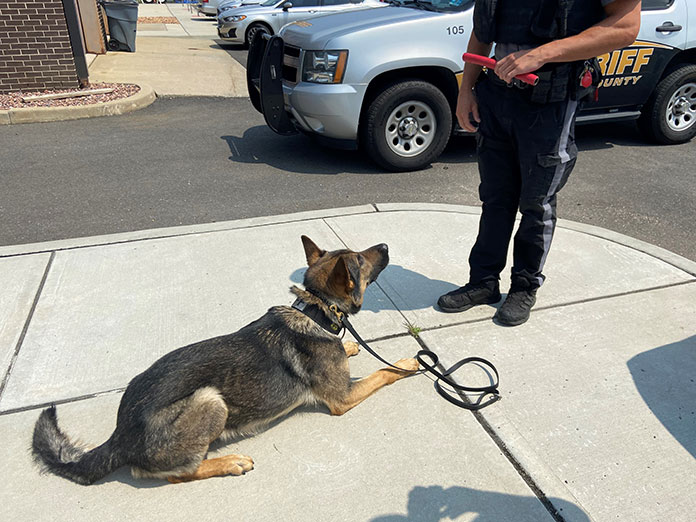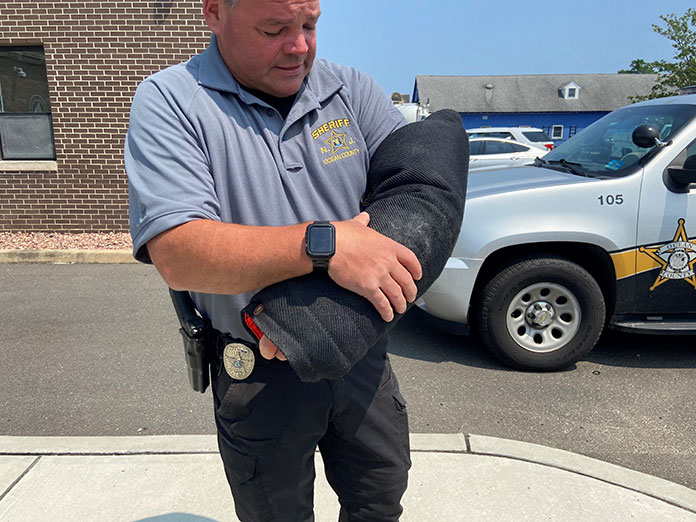
OCEAN COUNTY – Recently, New Jersey has joined the list of several other states who have legalized marijuana. But how will this decision effect K9 units and drug sniffing dogs?
Back in November, New Jersey residents voted on the Marijuana Legalization Amendment, with about 67 percent of residents voting ‘yes’ to legalize adult use of marijuana.
In other states like Virginia and New Mexico who have legalized the drug, many police departments made the stark decision to retire their narcotics dogs early. Here in Ocean County, the Sheriff’s Office had prepared for the decision since the beginning of 2020, before the amendment was even approved.
“It’s safe to say that we knew this was coming. So, we trained (the dogs) not to imprint on marijuana,” Ocean County Sheriff Michael Mastronardy said.
Departments like Ocean County train several dogs for multiple different uses. Along with narcotics dogs, you have bomb detection dogs, tracking dogs, patrol dogs and more.
James Reilly, a retired sergeant who served for 31 years at the Toms River Police Department and is now an Investigator at the Ocean County Sheriff’s Office, has worked with 26 K9s in his career. He explained how there’s more to K9 units than just drug sniffing dogs.

“You have dogs that sniff at arson scenes and can tell you where the accelerant was used, if it was used. You have bomb detection dogs that can tell you ‘Hey, this is not safe.’ They’ll do a lot of bomb sweeps for public events. You do have the narcotics dogs. You have dogs whose sole purpose is just tracking. They’ll track missing Alzheimer’s patients, a missing child or they could track a suspect that maybe assaulted somebody and left on foot. Then you have the patrol aspect who are capable of clearing a building to make sure nobody is hiding inside. They will also apprehend a suspect and can be used to clear an area outside to make sure nobody is hiding in the woods who committed a crime,” Reilly said.
When it comes to narcotics dogs, Reilly explained how once a dog has been trained and imprinted on the smell of marijuana, it’s impossible to retrain them and remove that odor from their palate.
“They’re trained on certain drugs, and they don’t know whether they are searching for that specific drug or any of the other ones they were imprinted on. So that’s why the dogs that are currently imprinted on marijuana become obsolete because they have been imprinted with this odor and they understand that odor gets them their reward and it’s next to impossible to remove that odor because they’ve been rewarded for it,” Reilly said. “The dogs that are imprinted on marijuana can be used still if there’s a search warrant. At that point even if they did indicate marijuana, we already have the right to be there. And they can sniff out other drugs they’ve been trained to do.”
To prepare for this change, the department stopped training narcotics dogs to imprint on the scent of weed. It would become an issue if police searched a car or home for drugs that turned out to be marijuana, as they would be violating that person’s rights.
“For a car, we wouldn’t use a dog imprinted on marijuana because they would be a violation, so those dogs will no longer be able to do that. But a lot of the more recent dogs, since we knew that this was coming, we stopped imprinting the dogs on marijuana,” Reilly said. “We can put the odor in the dog, but we can’t take it out. The last two classes I trained, I didn’t imprint marijuana on those dogs. So, you have dogs out there that are four to five years old, that have a lot of work life left in them but they’re imprinted on marijuana. They just can’t be used for that anymore.”
Reilly assured that their dogs who are imprinted on cannabis won’t be retiring any time soon. He explained how a majority of their K9s are cross trained, so they can be used for other situations.

“There’s still a lot of uses for them in the patrol aspect. If they were just a narcotics dog, then I could definitely see that (retiring). Most of our dogs are crosstrained, so they still have that patrol function and there is a use for them,” Reilly said. “As they near retirement, you may retire them a little earlier than you would have to.”
Officer Ray Vosseller’s partner, Duke, is a 3-year-old German shepherd and one of the first K9s at the Ocean County Sheriff’s Office trained not to be imprinted on marijuana. Now that weed is legal in the state, this change in training will become the new standard for future K9s.
“They’re a valuable tool. They have a big purpose and especially in Ocean and Monmouth County. There’s a lot of dogs out there and they do a lot of good. We train often and we try to make sure that these dogs maintain a standard that’s not just at the Attorney General’s level, but far exceeds it because that’s what the people deserve. They deserve the best dog that we can put out there,” Reilly said.
“We have a dog here that’s credited to saving his handler’s life. That just shows you that they’re very valuable to use and to the public,” Vosseller said.
“I think that there’s got to be a real appreciation for what these partners, and that’s what they are to these officers, these partners have done an incredible job historically for public safety in New Jersey and making the residents safe,” Mastronardy said. “What we’re doing is saving people’s lives and saving the officers. These partners are just an extraordinary asset to us and to public safety.”






